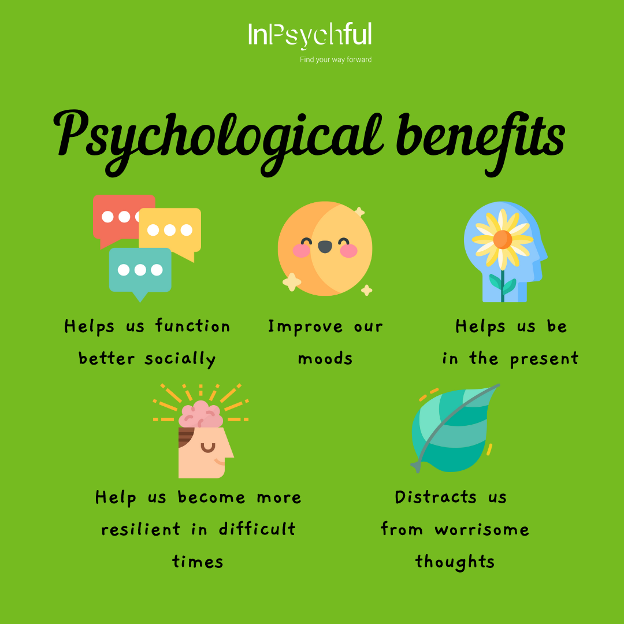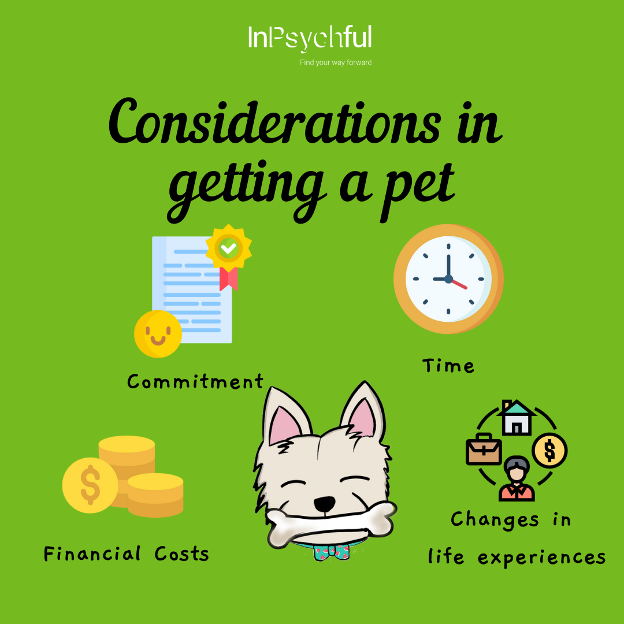Many of us would agree that having a pet is likely to bring us joy and laughter. Amidst the pandemic, various animal welfare organisations have noted a rise in the number of adoptions. For instance, Causes for Animals has found an almost two-fold increase in the adoption of dogs and cats (Khoo, 2020). Organisations such as Just for Paws and Chained Dog Awareness In Singapore, have observed a spike in enquires for adoption and fostering of dogs (Khoo, 2020).
Indeed, numerous articles and websites which suggests that pets do bring us benefits for our mental health and wellbeing. Having pets seems to help in reducing stress, anxiety, and depression, better deal with loneliness, increase physical activities, and even improve health (Lundgren, 2021).
While there are numerous studies on the benefits of having pets, there are other studies that highlight an opposite trend, where there are negative impacts, including negative feelings and emotional strain (Hawkins et al., 2021). We will explore benefits that pets can bring us while also touching on the negative effects that may arise for some.
Before we begin, it is important to note to consider the different aspects when it comes to bringing pets to your care. While having a pet may bring benefits to us, do remember that this is a commitment and think about the circumstances you are in. Some pets require more time for training, some requires regular walks, the environment in your home matters too.
Benefits
Psychological benefits
Having pets can help us become more resilient in times of difficulty and encourages us to engage in activities that are meaningful, function better socially, improve our moods and our ability to feel pleasure and improved self-image and self-agency (Zimolag & Krupa, 2009). Pets are also important for those experiencing social isolation as they provide as a social companion, which can buffer again negative effects of loneliness (Carr et al., 2020; Wood et al., 2005). Furthermore, the level of interactions with a pet is associated with positive affect which is related to emotional wellbeing (Janssens et al., 2020). There has been finding suggesting that having a pet around may be helpful in reducing urges to engage in self-harm and prevent suicide attempts (Hawkins, 2021).
You may be wondering how exactly pets can benefit us. It was found that pets help us to be in the present moment, promoting mindfulness, serves as a distraction from our worrisome thoughts and unhelpful thinking patterns and reduce rumination (Arditte Hall et al., 2019; Cooney et al., 2010). Others have found that pets gave them meaning in life (Hawkins, 2021). The sense of being mutually dependent on each other and a two-way support was found to be important as well (Young et al., 2020).
Health and physiological benefits
Having pets have been shown to bring about health and physiological benefits. There have been studies that shown that interacting with animals have reduced blood pressure and stress levels (Herzog, 2011).
For some, pets have been found to reduce symptoms such as physiological arousal which can potentially prevent panic attacks and relapses. This may further increase confidence to engage in seeking self-help and external support from health professional.
In particular, pet dogs appear to provide the most benefits in terms of health and wellbeing, which helps in recovery process (Friedmann et. al., 1980). They increase motivation for physical exercise, social contact and improve self-view of holistic wellbeing (Raina et al., 1999).
Wow pets are amazing, but do pets only bring us good?
It turns out, studies have found that pets may bring about some negative impacts in our lives, despite all the benefits that were mentioned earlier. Most notably, pets can cause emotional strain and negative feelings about themselves and their capability as owners (Hawkins, 2021). Some have felt guilt, anxiousness, and fear from pet ownership (Hayden-Evans et al., 2018).
Another aspect to owning pets would be bereavement, owing to the shorter lifespans of pets. This was a significant concern for many within the study and for some have worsened mental health conditions (Hawkins, 2021). Studies have found that such grievance can be as severe as a bereavement for another human (Lee, 2020) and this can have negative effects on personal and work life. Those who show especially strong bonds to their pets may find this loss more distressing (Cowles, 2016).
What does research say?
While many studies have shown the benefits of having animals, there are numerous studies which has found no difference between individuals with and without pets (Herzog, 2010) and other opposite effects compared to studies which shows the positive effect of pets. A dive into pet-effect research has found that while pets are undoubtedly beneficial for some, there needs to be more research done to support that as a group, pet owners are healthier and happier.
Considerations in getting a pet
Financial
Before purchasing pets, we have to consider financial aspects of it. Starting from initial one-off expenses to adopt or purchase a pet, to purchasing food and treats, medical expenses, costs of grooming to annual dog licensing, there are many costs involved in owning a pet. For example, owning a small dog can easily cost $1748.40 annually (excluding the initial one-off expenses and medical costs) (Ong, 2021).
Life experiences
Different life experiences may directly impact your pets as well. Events such as breakups, remarrying can have effects on pets. In the case where you’ve owned a pet with your previous partner, it is likely that the pet has formed a close bond between the two parties. After the decision to part ways, your per may feel a lot of anxiety as they are now uprooted from a stable home, where they are used to similar routines (Team Bonobology, 2021). In Singapore, pets are considered personal property under local laws, if there is no agreement on who to keep family pets in the case of divorce, the Court will make the final decision when it settles the matrimonial assets division (division of all properties acquired during the marriage) (Gloria James-Civetta & Co, n.d.).
It is also important to make it clear to your child that owning a pet comes with great responsibility before agreeing to own one. This will help to ensure that the pet will be well taken care of even as the children grows up.
In conclusion, pets can bring great benefits emotionally, physiologically, and socially. However, in considering if we should adopt or purchase pets, we need to consider other aspects as well, such as feelings of emotional strain, and negative feelings from inability to take care of our pets well. There are other things to think about when taking responsibility of pets, such as the commitment level, financial costs, environment, and time taken to care for the pets.
Camellia Wong (M.A), Tan Khai Teng
More Articles
I am Asian and Emotionally Distressed. Am I allowed to seek help for my problems?
Therapy in Singapore – The benefits and what to look out for
Reference
Hawkins, R. D., Hawkins, E. L., & Tip, L. (2021). “I can’t give up when i have them to care for”: People’s experiences of pets and their mental health. Anthrozoös, 34(4), 543–562. https://doi.org/10.1080/08927936.2021.1914434
Herzog, H. (2011). The impact of pets on human health and psychological well-being: Fact, fiction, or hypothesis? Current Directions in Psychological Science, 20(4), 236–239. https://doi.org/10.1177/0963721411415220
Zimolag, U., & Krupa, T. (2009). Pet ownership as a meaningful community occupation for people with serious mental illness. American Journal of Occupational Therapy, 63(2), 126–137. https://doi.org/10.5014/ajot.63.2.126
Carr, D. C., Taylor, M. G., Gee, N. R., & Sachs-Ericsson, N. (2020). Psychological health benefits of companion animals following a social loss. The Gerontologist, 60(3), 428–438. https://doi.org/10.1093/geront/gnz109
Wood, L., Giles-Corti, B., & Bulsara, M. (2005). The pet connection: Pets as a conduit for social capital? Social Science & Medicine, 61(6), 1159–1173. https://doi.org/10.1016/j.socscimed.2005.01.017
Janssens, M., Eshuis, J., Peeters, S., Lataster, J., Reijnders, J., Enders-Slegers, M.-J., & Jacobs, N. (2020). The pet-effect in daily life: An experience sampling study on emotional wellbeing in pet owners. Anthrozoös, 33(4), 579–588. https://doi.org/10.1080/08927936.2020.1771061
Arditte Hall, K. A., Quinn, M. E., Vanderlind, W. M., & Joormann, J. (2019). Comparing cognitive styles in social anxiety and major depressive disorders: An examination of rumination, worry, and reappraisal. British Journal of Clinical Psychology, 58(2), 231–244. https://doi.org/10.1111/bjc.12210
Cooney, R. E., Joormann, J., Eugène, F., Dennis, E. L., & Gotlib, I. H. (2010). Neural correlates of rumination in depression. Cognitive, Affective, & Behavioral Neuroscience, 10(4), 470–478. https://doi.org/10.3758/CABN.10.4.470
Young, J., Bowen-Salter, H., O’Dwyer, L., Stevens, K., Nottle, C., & Baker, A. (2020). A qualitative analysis of pets as suicide protection for older people. Anthrozoös, 33(2), 191–205. https://doi.org/10.1080/08927936.2020.1719759
Friedmann, E., Katcher, A. H., Lynch, J. J., & Thomas, S. A. (1980). Animal companions and one-year survival of patients after discharge from a coronary care unit. Public Health Reports (Washington, D.C.: 1974), 95(4), 307–312.
Raina, P., Waltner-Toews, D., Bonnett, B., Woodward, C., & Abernathy, T. (1999). Influence of companion animals on the physical and psychological health of older people: An analysis of a one-year longitudinal study. Journal of the American Geriatrics Society, 47(3), 323–329. https://doi.org/10.1111/j.1532-5415.1999.tb02996.x
Hayden-Evans, M., Milbourn, B., & Netto, J. (2018). ‘Pets provide meaning and purpose’: A qualitative study of pet ownership from the perspectives of people diagnosed with borderline personality disorder. Advances in Mental Health, 16(2), 152–162. https://doi.org/10.1080/18387357.2018.1485508
Lee, S. A. (2020). Does the DSM-5 grief disorder apply to owners of deceased pets? A psychometric study of impairment during pet loss. Psychiatry Research, 285, 112800. https://doi.org/10.1016/j.psychres.2020.112800
Cowles, K. V. (1985). The death of a pet: Human responses to the breaking of the bond. Marriage & Family Review, 8(3–4), 135–148. https://doi.org/10.1300/J002v08n03_10
Gloria James-Civetta & Co.(n.d.) Who Gets Custody of the Pets in the Event of a Divorce?https://www.singaporedivorcelawyer.com.sg/who-gets-custody-of-the-pets-in-the-event-of-a-divorce/
Khoo, H. (2020, Aug 29). More people in Singapore interested in adopting or fostering pets during Covid-19 pandemic. The Straits Times. https://www.straitstimes.com/lifestyle/home-design/more-interested-in-adopting-or-fostering-pets-during-covid-19-pandemic-as-they
Lundgren, K., Robinson, L., Segal R., (2021, July). The Health and Mood-Boosting Benefits of Pets. Help Guide. https://www.helpguide.org/articles/mental-health/mood-boosting-power-of-dogs.htm
Ong, G. (2021, July 8). The Real Cost of Dog Ownership In Singapore. SingSaver. https://www.singsaver.com.sg/blog/real-cost-of-dog-ownership
Team Bonobology (2021, August 26). This Is How Your Breakup Affects Your Pet: A Dog’s Point Of View.Bonobology. https://www.bonobology.com/break-affects-pet-dogs-point-view/



